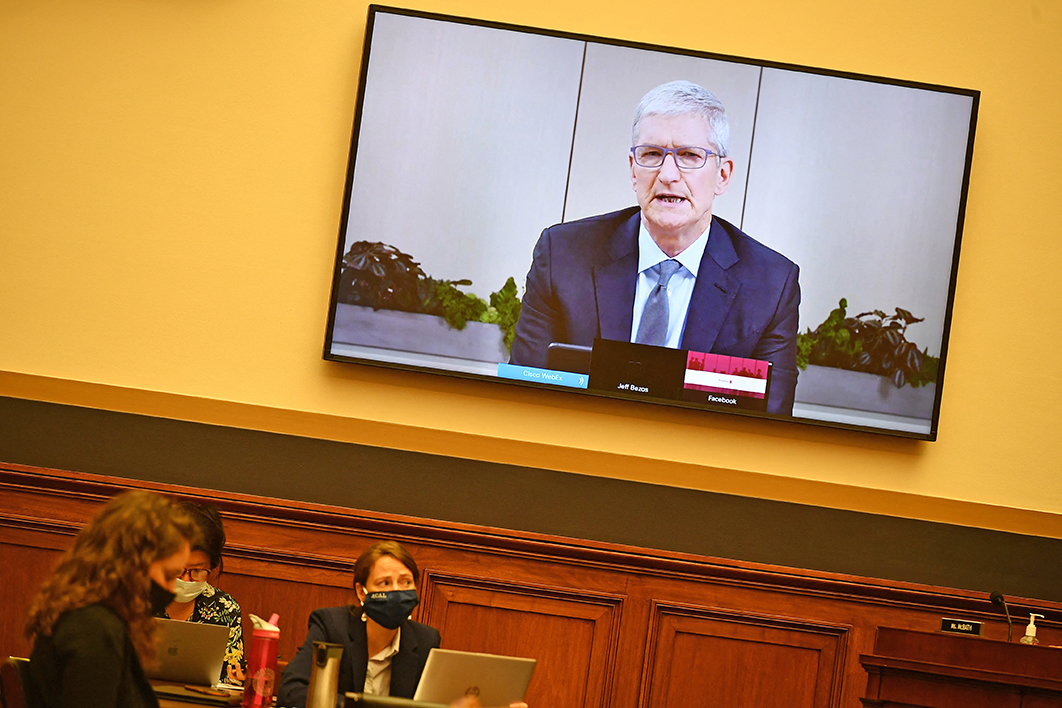Coming in the middle of the deepest recession for decades, the news that Apple Inc. has become the first US company with a stock market valuation of more than US$2 trillion might seem paradoxical. Admittedly, Apple’s business hasn’t been harmed by the Covid-19 pandemic, but neither has it greatly benefited — earnings in the June quarter were only about 10 per cent higher than in 2019, yet the stock price has doubled in less than six months.
Even more striking is the ratio of Apple’s share price to the book value of assets. Most of the time, the market value of a company is about equal to the value of its physical capital, so that the price-to-book ratio is close to one. For Apple, the ratio is a startling twenty-seven to one.
Much the same story can be told about other leading tech stocks. Along with Apple, Alphabet (owner of Google), Amazon, Facebook and Microsoft account for around 20 per cent of the total value of the S&P 500 Index. They have price-to-book ratios ranging from five (Google) to twenty (Amazon).
The difference between the book value of physical assets and the stock price is commonly explained by “intangibles.” That term can cover all sorts of things, and is often taken to refer to some special aspect of the firm in question, such as accumulated research and development, tacit knowledge or the “goodwill” associated with its brand.
At most, R&D is a small part of the story. The leading tech companies each spend between ten and twenty billion dollars a year on R&D, a tiny fraction of their market valuations. And while the big tech firms still retain plenty of goodwill among consumers, the attitude of their business partners is better described as one of resentful dependence. Software developers who want access to the iPhone market have little choice but to go through Apple’s App Store and give Apple 30 per cent of their revenue. Amazon’s Web Services platform has a similar hold on e-commerce. And so on.
The main intangible asset held by these companies is their monopoly power, which arises from network effects (every extra user adds to the value of the business for all users), their intellectual property, and good old-fashioned predatory behaviour. In this context, the crucial point about intangibles isn’t that they aren’t physical, it’s that they can’t be reproduced by anyone else.
No one can sell a Windows or Apple operating system, even if he or she were willing to invest the effort required to reverse-engineer it. While there are competitors for Google’s search engine (I recommend DuckDuckGo), the barriers to entry are huge, notably including the fact that the product is “free,” or rather supported by advertising for which all consumers pay whether they use Google or not.
There’s a complicated relationship here between the rise of monopoly and the development of the information economy in which the top tech firms operate. Information is the ultimate “non-rival” good. Once it’s generated by one person it can be shared with anyone else without diminishing in value. As the cost of communication has fallen, it’s become possible for everyone in the world to gain access to new information at essentially zero cost.
What this means is that there is very little relationship between the value of information and the ability of corporations to capture value from it. The protocols and languages that make the internet possible are a public good, created by collaborative effort and made freely available. The information on the internet is generated by households, businesses and governments using these protocols.
Without these public goods, Google would be worthless. But because advertising can be attached to search results, ownership of a search engine is immensely profitable. Similarly, Facebook’s value is derived entirely from the contributions of its users. Apple and Amazon are more like traditional businesses, but increasingly rely on internet services for their profits. Thus, a network created in the public sector has become the underlying infrastructure for private monopolies.
It is easier to diagnose the problem than to suggest a cure. Traditional remedies such as reversing anti-competitive mergers might improve the situation a little. But the ultimate solution is likely to require returning the internet to its non-commercial roots and treating crucial services like search and e-commerce platforms as public utilities, subject to tight regulation or public ownership.
Such changes would require a radical reversal of the opposition to public ownership that is still the default position of public policy, despite decades of failed market reforms. But if there is one thing that the last few years have taught us it is that, for good or ill, radical change only seems unthinkable until it happens. •




